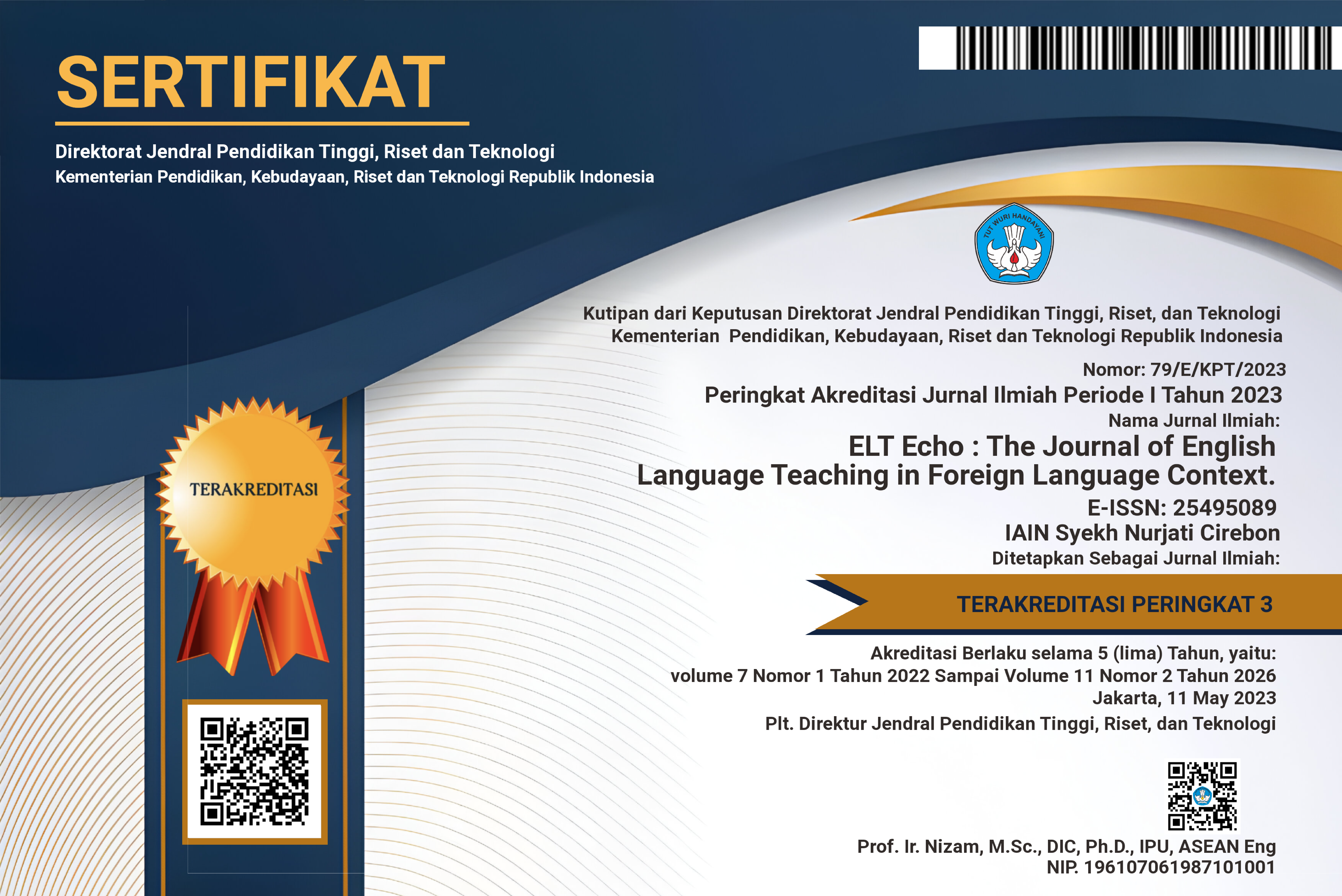Translating Idiomatic Expressions: An Attempt to Raise the Students' Pragmatic Awareness
(1) Universitas Negeri Semarang
(*) Corresponding Author
Abstract
Keywords
Full Text:
PDFReferences
Adyagarini, Getari, Amin Lestari, and Ahmad Munir. 2019. TEACHERS’ PRACTICES ON RAISING STUDENTS’ PRAGMATIC AWARENESS: CHALLENGES AND REFLECTIONS FOR EFL TEACHERS. Vol. 2.
Alcon, Eva, and Maria Jorda. 2008. “Pragmatic Awareness in Second Language.†6:193–204.
Alshraah, Shadi Majed, Enas Mohamed S. Aly, and Saleem Mohd Nasim. 2024. “Pragmatic Realization in Exploiting Request Expressions: A Study of Language Proficiency and Social Context among Saudi EFL Learners.†International Journal of Society, Culture and Language 12(1):412–26. doi: 10.22034/ijscl.2023.2013758.3233.
Bao, Wei. 2020. “COVIDâ€19 and Online Teaching in Higher Education: A Case Study of Peking University.†Human Behavior and Emerging Technologies 2(2):113–15. doi: 10.1002/hbe2.191.
Bardovi-Harlig, Kathleen, and Robert Griffin. 2005. “L2 Pragmatic Awareness: Evidence from the ESL Classroom.†System 33(3):401–15. doi: 10.1016/j.system.2005.06.004.
Celce-Murcia, Marianne. 2007. “Rethinking the Role of Communicative Competence.†Intercultural Language Use and Language Learning 41–57.
Cheng, Tsui Ping. 2016. “Authentic L2 Interactions as Material for a Pragmatic Awareness-Raising Activity.†Language Awareness 25(3):159–78. doi: 10.1080/09658416.2016.1154568.
Croker, Robert A. 2009. “Qualitative Research in Applied Linguistics.†edited by J. Heigham and R. A. Croker. Palgrave Macmillan.
Davies, Catherine Evans. 2004. “Developing Awareness of Crosscultural Pragmatics: The Case of American/German Sociable Interaction.†Multilingua 23(3):207–31. doi: 10.1515/mult.2004.010.
Eslami-Rasekh, Zohreh. 2005. “Raising the Pragmatic Awareness of Language Learners.†ELT Journal 59(3):199–208. doi: 10.1093/elt/cci039.
Hosseini, Mohammad Baqerzadeh, and Hossein Pourghasemian. 2019. “Comparing the Effects of Explicit and Implicit Teaching Using Literary and Nonliterary Materials on Learner’s Pragmatic Comprehension and Production.†Cogent Education 6(1). doi: 10.1080/2331186X.2019.1662979.
House, Juliane. 2008. “INVESTIGATING PRAGMATICS IN FOREIGN LANGUAGE LEARNING, TEACHING AND TESTING.†Pp. 135–52 in The Cromwell Press, edited by A. E. Soler and A. Martinez-Flor. Bristol.
Ishihara, Noriko. 2007. “Web-Based Curriculum for Pragmatics Instruction in Japanese as a Foreign Language: An Explicit Awareness-Raising Approach.†Language Awareness 16(1):21–40. doi: 10.2167/la398.0.
Korkmaz, Sedat, and Çiğdem Karatepe. 2023. “Exploring the Pragmatic Awareness and Competence of EFL Instructors at Tertiary Level.†Anadolu Journal of Educational Sciences International 13(1):34–55. doi: 10.18039/ajesi.1086084.
Lertola, Jennifer, and Cristina Mariotti. 2017. “Reverse Dubbing and Subtitling: Raising Pragmatic Awareness in Italian English as a Second Language (ESL) Learners.†Journal of Specialised Translation (28):103–21.
Nabila, Afanin, and Hamidah Daulay. 2023. “CROSS-CULTURAL PRAGMATICS FAILURE IN ESL CLASSROOM.†Pp. 308–17 in Conference on English Language Teaching.
Perdhani, Widya Caterine. 2016. “Interlanguage Pragmatic Motivation in EFL Context.†IJELTAL (Indonesian Journal of English Language Teaching and Applied Linguistics) 1(1):75. doi: 10.21093/ijeltal.v1i1.8.
Rafieyan, Vahid. 2016. “Bridging Pragmatic Gap in Translation Process through Developing Pragmatic Awareness.†Journal for the Study of English Linguistics 4(1):98. doi: 10.5296/jsel.v4i1.9667.
Rahmawati, Ninda, and Febrina Dafit. 2022. “Analisis Pemanfaatan Media Pembelajaran Masa Pandemi Covid-19 Di SDN 193 Pekanbaru.†JURNAL PENDIDIKAN DAN KONSELING 4(2):17–25.
Riddiford, Nicky, and Angela Joe. 2010. “Tracking the Development of Sociopragmatic Skills.†TESOL Quarterly 44(1):195–205. doi: 10.5054/tq.2010.215252.
Shojaei, Amir. 2012. “Translation of Idioms and Fixed Expressions: Strategies and Difficulties.†Theory and Practice in Language Studies 2(6):1220–29. doi: 10.4304/tpls.2.6.1220-1229.
Van Thao, Nguyen, and Herman. 2021. “An Analysis of Idiomatic Expressions Found in Ed Sheeran’s Selected Lyrics Songs.†Middle European Scientific Bulletin 8(January):247–55.
Timpe-Laughlin, Veronika, Ashley Green, and Saerhim Oh. 2021. “Raising Pragmatic Awareness: A Think-Aloud Study.†System 98:102470. doi: 10.1016/j.system.2021.102470.
Valdeón, Roberto A. 2015. “The (Ab)Use of Taboo Lexis in Audiovisual Translation: Raising Awareness of Pragmatic Variation in English-Spanish.†Intercultural Pragmatics 12(3):363–85. doi: 10.1515/ip-2015-0018.
DOI: 10.24235/eltecho.v9i2.18345
Article Metrics
Abstract view : 23 timesPDF - 9 times
Refbacks
- There are currently no refbacks.
Â
This Journal is indexed by:
Â

This work is licensed under a Creative Commons Attribution 4.0 International License.










